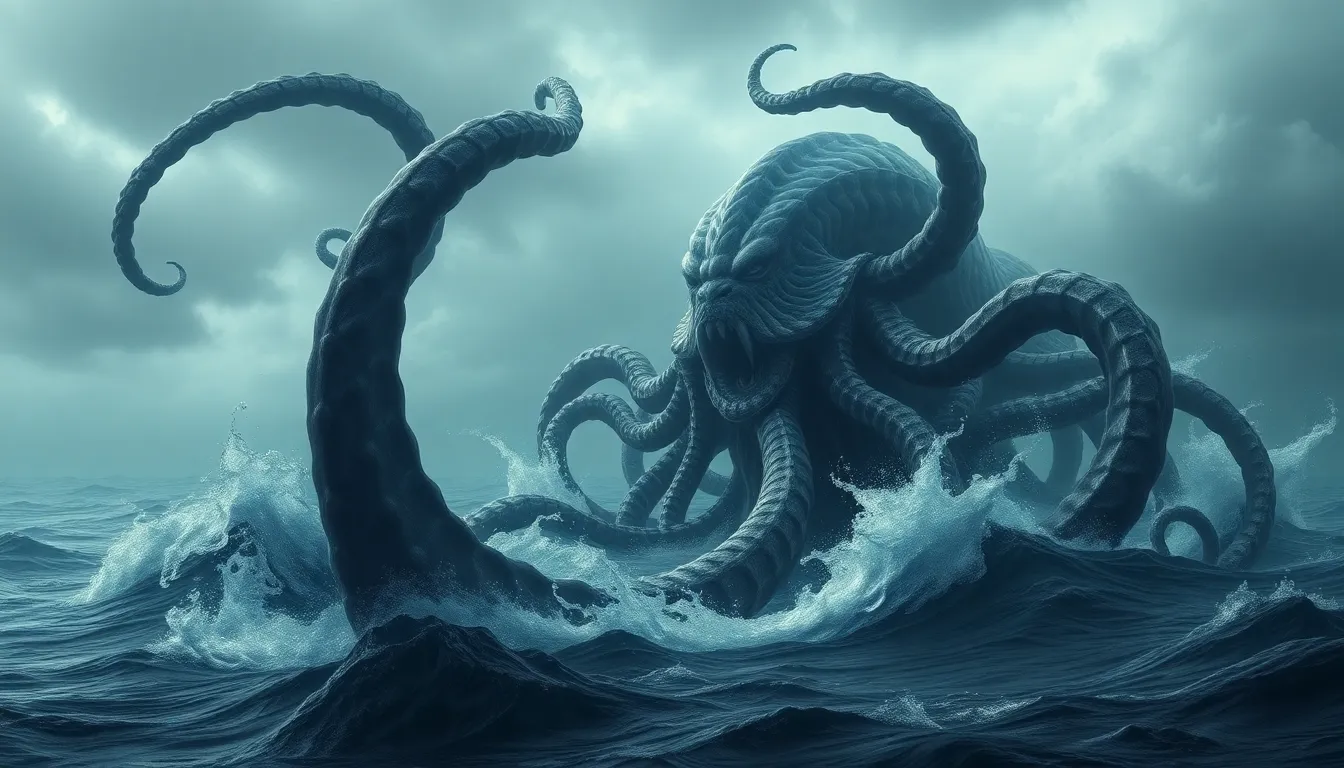The Myth of the Kraken: The Sea Monster of Ancient Lore
Introduction
The Kraken, a legendary sea monster, has captivated the imagination of people for centuries. This mythical creature, often depicted as a gigantic octopus or squid, has become a symbol of the mysteries lurking beneath the ocean’s surface. The importance of sea monsters, like the Kraken, in ancient cultures cannot be overstated; they represent humanity’s fears, curiosities, and the unknown aspects of the natural world. This article aims to explore the origins, cultural interpretations, and the enduring legacy of the Kraken in folklore and contemporary society.
Origins of the Kraken Myth
The myth of the Kraken can be traced back to historical accounts in Norse mythology. Sailors of the past, who spent months at sea, often recounted tales of monstrous creatures lurking in the depths. These stories were not merely for entertainment; they served to explain the dangers of the ocean and to rationalize the unknown phenomena encountered on their voyages.
Sailors’ tales played a crucial role in shaping the legend of the Kraken. As seafarers shared their experiences, the creature evolved from a mere anecdote to a full-fledged myth, embellished with each telling. Furthermore, the encounters with real-life sea creatures, such as giant squids and colossal squids, likely fueled the imagination, leading to the conception of the Kraken as an enormous beast capable of dragging ships underwater.
Cultural Interpretations of the Kraken
The Kraken has been depicted in various ways across different cultures, particularly in Scandinavian folklore. In these tales, the Kraken was often characterized as a terror of the sea, capable of attacking ships and consuming sailors. Its immense size and strength made it a formidable foe, embodying the fears of those who ventured into the unknown waters.
Literature has also played a significant role in the popularity of the Kraken. From Jules Verne’s works, where it was depicted as a monstrous threat, to modern adaptations in fantasy literature, the Kraken has evolved as a central figure in storytelling. Additionally, artistic representations have flourished throughout history, with painters and illustrators capturing the creature’s terrifying beauty in various forms.
The Kraken in Popular Culture
In recent years, the Kraken has made a significant impact on popular culture. It has been featured in numerous films and television series, often portrayed as a formidable antagonist. Notable examples include:
- Pirates of the Caribbean: The Kraken is depicted as a monstrous creature that attacks ships, enhancing the film’s adventurous narrative.
- Clash of the Titans: The Kraken serves as a central figure in this fantasy epic, further cementing its place in modern mythology.
- Various animated series: The Kraken often appears as a humorous or exaggerated character, showcasing its versatility in storytelling.
In addition to film and television, the Kraken has made its way into video games and board games, becoming a beloved character that players can engage with. Merchandise featuring the Kraken, from toys to clothing, has also proliferated, indicating the commercialization of this ancient myth.
Scientific Explanations for the Kraken Legend
While the Kraken is rooted in myth, there are scientific explanations that may have inspired its legend. Giant squids, which can grow up to 43 feet long, and other marine life such as the colossal squid, may have been mistaken for the Kraken by sailors encountering them on the high seas. These real creatures possess the size and features that align with the legendary descriptions.
Moreover, oceanic phenomena, such as whirlpools or large waves, could have contributed to the stories surrounding the Kraken. Historical sightings often involved misidentifications of marine animals or natural occurrences, leading to embellishments and the creation of the Kraken myth.
Symbolism of the Kraken in Literature and Art
The Kraken serves as a powerful metaphor in literature and art, representing the unknown and the primal fears associated with the sea. It embodies chaos, danger, and the unpredictable nature of the ocean, reflecting humanity’s struggles against nature. Key themes include:
- The unknown: The vastness of the ocean and the mysteries it holds are often symbolized by the Kraken.
- Chaos: The Kraken represents the uncontrollable forces of nature that can disrupt human life.
- Reimagining the beast: Modern storytelling often portrays the Kraken in various lights, from a villain to a misunderstood creature, exploring its complexity.
The Kraken in Maritime Folklore and Superstitions
Sailor superstitions surrounding the Kraken have persisted through generations. Many sailors believed that the appearance of the Kraken was an omen of disaster, while others viewed it as a guardian of the ocean’s secrets. The Kraken’s influence on navigation and seafaring practices is evident in the caution exercised by sailors when traversing unknown waters.
Tales of encounters with the Kraken often blur the lines between fact and fiction. Some sailors claimed to have seen the creature rise from the depths, while others shared stories of ships lost to its grasp. These anecdotes reflect the fears and uncertainties of life at sea, illustrating how myth and reality intertwine in maritime folklore.
Modern-Day Interpretations and Adaptations
The Kraken has experienced a resurgence in fantasy genres, becoming a popular symbol in contemporary storytelling. Its representation has evolved, often reflecting current societal concerns, including environmental issues. The Kraken has become a metaphor for the fragility of marine ecosystems, emphasizing the need for conservation and protection of ocean life.
Furthermore, social media has played a significant role in reviving the Kraken myth. Memes, art, and discussions about the creature have proliferated online, allowing new generations to explore and reinterpret the legend. This digital renaissance has breathed new life into the Kraken, ensuring its place in modern folklore.
The Legacy of the Kraken in Contemporary Society
The Kraken has transformed into a cultural icon, influencing various media forms, from literature to films and merchandise. Its legacy extends beyond entertainment, impacting marine conservation efforts and raising awareness of ocean-related issues. The fascination with sea monsters persists, as they continue to symbolize humanity’s complex relationship with nature.
In contemporary society, the Kraken serves as a reminder of the power of myths and storytelling. It encourages us to explore the unknown, confront our fears, and appreciate the mysteries of the world around us.
Conclusion
In summary, the Kraken myth has evolved significantly over the centuries, reflecting humanity’s fears, curiosities, and understanding of the natural world. From its origins in Norse mythology to its modern interpretations in popular culture, the Kraken remains a compelling figure that continues to captivate imaginations. Myths like the Kraken are essential for understanding the human experience and our ongoing fascination with the unknown. As we look to the future, the Kraken will undoubtedly remain a vital part of folklore and culture, reminding us of the mysteries that still lie beneath the ocean’s surface.



